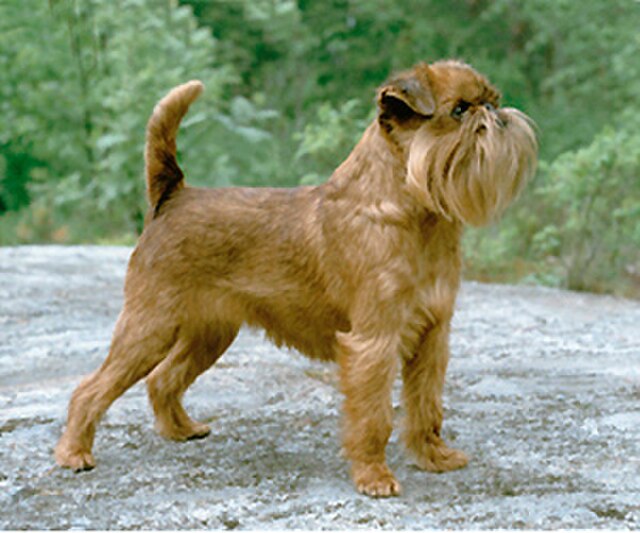


The Brussels Griffon is a small, compact breed known for its unique appearance, often described as "human-like" due to its expressive, almost comical face. These dogs are affectionate, curious, and lively, making them excellent companions for families, especially those with a more sedentary lifestyle. Brussels Griffons are known for their strong bond with their owners and their loving, loyal nature. Despite their small size, they possess a confident and bold personality, often acting much bigger than they really are.
The Brussels Griffon originated in Belgium, specifically in the city of Brussels, in the 19th century. The breed was developed by crossing small terriers with the Brussels Griffon, a breed known for its distinctive face and personality. Originally bred as a working dog, the Brussels Griffon was used to catch rats in stables and barns. Over time, the breed's affectionate nature and unique appearance made them increasingly popular as companion animals, especially among the Belgian upper class. In the early 20th century, the Brussels Griffon made its way to other countries, including the United States, where it became recognized by various kennel clubs, including the American Kennel Club (AKC) in 1904.
The Brussels Griffon is a small breed, typically standing between 7 to 10 inches tall at the shoulder and weighing between 8 to 12 pounds. They have a distinctive, round face with large, dark eyes and a short, flat muzzle that gives them a unique "Griffon" expression. Their ears are usually small and stand erect, though some may have slightly floppy ears. Brussels Griffons have two distinct coat types: a rough coat, which is dense and wiry, and a smooth coat, which is short and glossy. Their coat comes in a variety of colors, including red, black, and tan, or a mix of both. The Brussels Griffon’s tail is often carried high and may be docked, though some countries allow the tail to remain natural.
Brussels Griffons are known for their charming, affectionate, and playful personalities. Despite their small size, they have a confident and curious demeanor. They are loyal to their families and tend to bond very closely with their owners. These dogs are often described as "velcro dogs" because they love to be close to their humans and are usually very attached to their family members. They can be a bit reserved with strangers, but they are generally not aggressive. Brussels Griffons are also quite intelligent and can be independent, which means they can sometimes exhibit a stubborn streak. However, their playful nature makes them a delight to have as a companion, and they are generally good with children and other pets when properly socialized.
Brussels Griffons are a relatively low-energy breed that requires only moderate exercise. While they enjoy playtime and short walks, they do not need the extensive physical activity that larger, more active breeds require. A few short walks each day, combined with interactive playtime, will be sufficient to keep them happy and healthy. Due to their small size, they are well-suited to apartment living and do not need a large yard to be content. However, they still need mental stimulation, as they are an intelligent breed. Engaging them in puzzle games, training exercises, and interactive toys can help keep their minds sharp and prevent boredom.
Brussels Griffons are intelligent and eager to please, but they can also be somewhat independent and stubborn. This can make training a bit challenging, especially for first-time dog owners. However, they respond well to positive reinforcement methods, such as treats and praise, and consistent, patient training can help them learn basic commands. Early socialization is important for Brussels Griffons, as they can be wary of strangers or unfamiliar situations if not properly exposed to them. Socializing them with people, other dogs, and different environments from a young age will help ensure that they grow up to be well-adjusted and confident. It's important to remember that Brussels Griffons are not always quick to learn the "come" command, so care should be taken to train them securely, especially when off-leash.
Brussels Griffons are generally healthy dogs, but like all breeds, they can be prone to certain health issues. Some common health problems in the breed include respiratory issues due to their short muzzle, dental problems, and eye conditions such as cataracts and progressive retinal atrophy. Regular veterinary check-ups are essential to monitor their health and address any concerns early. Their grooming needs depend on their coat type. For rough-coated Brussels Griffons, regular hand-stripping is needed to maintain their coat’s texture, while smooth-coated Griffons require only occasional brushing to keep their coat clean and healthy. Due to their small size and short muzzle, Brussels Griffons should be protected from extreme heat, as they can be prone to overheating. Their small ears should also be checked regularly for wax buildup or infection.
The average lifespan of a Brussels Griffon is between 12 and 15 years. With proper care, including a healthy diet, regular exercise, and routine veterinary check-ups, they can live a long and healthy life. Their small size contributes to their longevity, as small dogs generally live longer than larger breeds. However, it's important to maintain their health through regular monitoring for any potential health problems, especially those related to their respiratory system or eyes.
© copyright Dog Compendium 2024 - 2026